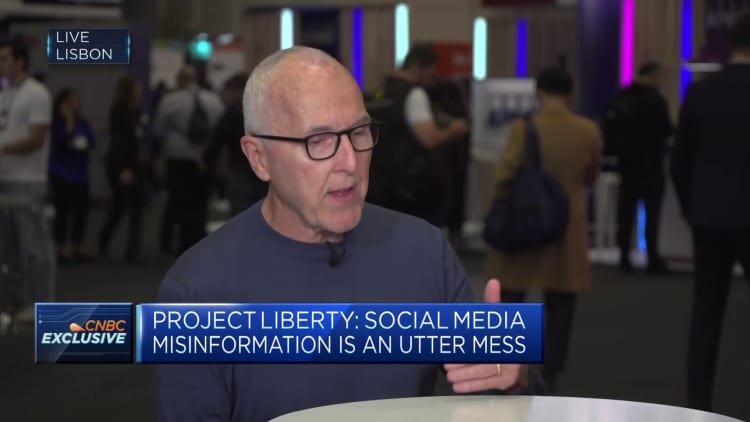
Tech execs have voiced concern that the development of artificial intelligence is concentrated in the hands of too few companies, potentially giving them excessive control over the rapidly evolving technology.
An explosion of interest in AI was sparked by OpenAI’s ChatGPT late last year thanks to the novel way in which the chatbot can answer user prompts.
Its popularity contributed to the start of what many in the tech industry have called an AI arms race, as tech giants including Microsoft and Google seek to develop and launch their own artificial intelligence models. These require huge amounts of computing power as they are trained on massive amounts of data.
“Right now, there are only a handful of companies with the resources needed to create these large-scale AI models and deploy them at scale. And we need to recognize that this is giving them inordinate power over our lives and institutions,” Meredith Whittaker, president of encrypted messaging app Signal, told CNBC in an interview last week.
“We should really be concerned about, again, a handful of corporations driven by profit and shareholder returns making such socially consequential decisions.”
Whittaker previously spent 13 years at Google but became disillusioned in 2017 when she found out the search giant was working on a controversial contract with the Department of Defense known as Project Maven. Whittaker grew concerned Google’s AI could potentially be used for drone warfare and helped organize a walkout at the company that involved thousands of employees.
“AI, as we understand it today, is fundamentally a technology that is derivative of centralized corporate power and control,” Whittaker said.
“It is built on the concentrated resources that accrued to a handful of large tech corporations, largely based in the U.S. and China via the surveillance advertising business model, which gave them powerful computational infrastructure and huge amounts of data; large markets from which to pull that data; and the ability to process and structure that data in ways useful for creating new technologies.”
Whittaker is not alone in this view.
Frank McCourt, the former owner of the Los Angeles Dodgers baseball team, now runs Project Liberty, an organization looking to motivate technologists and policymakers “to build a more responsible approach to technology development,” according to its website.
McCourt also thinks AI could give too much power to tech giants. He said there are “basically five companies that have all the data,” although he didn’t name the firms.
“Large language models require massive amounts of data. If we don’t make changes here, the game is over … Only these same platforms will prevail. And they’ll be the beneficiaries,” McCourt told CNBC in an interview last week.
“Sure, people will come and build small things on those big platforms. But it’s the big underlying platforms that control this data that will be the winners.”

Whittaker and McCourt are among those who feel users have lost control of their data online and that it is being harnessed by technology giants to feed their profits.
“Big tech and social media giants are inflicting profound damage on our society,” says McCourt’s Project Liberty manifesto says. And he believes AI could make this worse.
“Let’s not be fooled, generative AI is a fancy name for a more powerful usage of our data,” McCourt said in his CNBC interview.
Generative AI is the technology that describes applications like ChatGPT. The models underpinning these apps are trained on vast amounts of data.
“Generative AI built with large language models are basically enhanced, or more powerful versions, of the technology we have now, given a fancy name. It is centralized, autocratic surveillance technology. And that, I’m against. And I think it’s doing a lot of harm in the world right now,” McCourt said.
The inventor of the web, Tim Berners Lee, has also raised concerns about the concentration of power among the tech giants.
For Jimmy Wales, the founder of Wikipedia, it is the state of social media that is of particular concern right now.
On AI, however, he feels that while the technology giants now are leading the way, there is space for disruption.
In an interview with CNBC last week, Wales pointed to a leaked Google memo this year in which a researcher at the U.S. tech giant said the company has “no moat” in the AI industry, referring to a threat from open-source models. These are AI models that are not owned by a single entity, such as Google or Microsoft, and instead can be developed and added to by anyone. These could potentially see the creation of competing AI applications without the massive amount of resources it currently takes.
“The models that are out there, and open source models that anybody can download and run on a few machines that a startup can spend [just] $50,000 training … that’s not a big deal at all. It’s really impressive,” Wales added.

Credit: Source link














